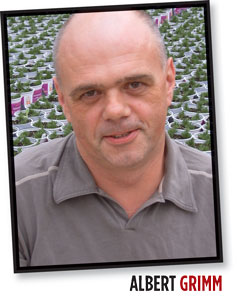5/29/2015
Making Waves
Albert Grimm

It’s probably true that we’re only as old as we feel, but there are days when my feelings can no longer ignore the fact that my age is advancing steadily. Mind you, I can still show off and work harder and faster than everybody else. But such brief episodes of self-delusion come with an increasingly painful price tag and it should probably not surprise me that occasional thoughts about retirement sneak up when I don’t pay attention.
As we approach retirement—or more correctly, as we get closer to the state of reduced productivity, which equates to retirement for most farmers—we have to face the reality that eventually we’ll have to leave behind everything that defines us as professionals. There will come a time when we no longer have the opportunity to contribute much to this world. Whether we like it or not, another generation will succeed us. Whether our legacy is meaningful to them depends entirely on how we prepare them and on what wisdom we’re able to pass on to them. In my mind, this is the essence of succession planning.
Popular thought often reduces succession planning to a set of rules for our successors, which aim to avoid haggling over the spoils leftover from our careers. It’s unlikely, however, that any of us will be remembered for the money that we left behind—at least not for a long time. There are more facets to succession planning than the mere distribution of wealth. I would argue that it’s much more important to create a lasting legacy, which helps future generations use our life experience to better themselves and to create a better world for their children.
The gerontologist Walter Bortz, author of “Roadmap to 100,” uses a fitting metaphor, when he likens our impact on future generations to “ripples in the universe,” which perpetuate like waves on the surface of a pond. What remains of our lifetime creates ripples in the activities of those that come after us and this is one way to create meaning in the beyond. The waves keep moving across the water, but our pennies quickly sink into the mud. Consequently, if we want to leave a meaningful impact on the world, we shouldn’t be afraid of making waves. We won’t be remembered for our money, but for all those little ways in which we were able to influence, help and shape future generations.
Teaching and mentoring are far more effective and profound means of creating such a legacy than mere monetary handouts to prospective successors. This is particularly true for our industry. We have a serious generational gap among greenhouse professionals, where many of the most experienced operators are close to retirement and most of the potential successors are still in the very early stages of their career. The next generation of growers does not yet have the tools and experience necessary to keep them from making potentially disastrous mistakes.
The role of our older generation of growers needs to morph into one of mentorship and teaching if we want to help another generation accomplish meaningful success in our industry. The role of a mentor is often misunderstood, both by the teacher and by the student. Mentorship has nothing to do with imprinting our own unyielding methods onto our successors. Far from it. Mentorship requires us to help others build trust in themselves and in their own abilities. It means that we counsel them with the accumulated wisdom that comes from a lifetime of farming-reality, while allowing them to develop their own ways of coping.
It also means helping them to avoid all the pitfalls and traps that we may have inadvertently stepped into, while we were still learning ourselves. This is where the value of our contributions will be found as we grow older. We may not be able to offer as much physical energy as we would like, but we certainly can offer a degree of wisdom. In our industry, wisdom is largely equivalent to experience, and to an accumulation of mistakes that we made and then corrected. We learned to avoid the traps and that made us successful.
Incidentally, the word “success” originates from the Latin word
succedere, which translates as “to follow” and “to prosper.”
GT
Albert Grimm is head grower for Jeffery’s Greenhouses in St. Catharines, Ontario, Canada.